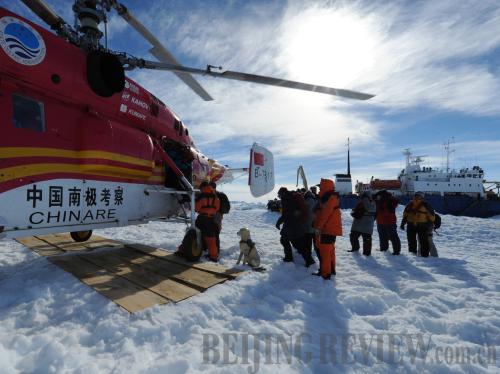|
 |
|
CHOPPER RESCUE: Passengers from the trapped Russian vessel Akademik Shokalskiy prepare to board the Chinese helicopter Xueying 12 on January 2 (ZHANG JIANSONG) |
By January 7, the Chinese icebreaker Xuelong (Snow Dragon) had been making preparations to free itself for days, warming up its engine and creating an "ice-breaking runway" for itself by sailing back and forth while waiting for a favorable westward wind. The vessel had been trapped since January 3, after its mission to rescue 52 passengers on board a stranded Russian ship. The edge of the massive expanse of ice, had begun to loosen, and some small openings had begun to appear. At 18:30 Beijing time on January 7, Xuelong broke through the ice surrounding it and successfully made it back out into open water.
In the Antarctic, China fulfilled its commitment as a responsible power through the selfless rescue undertaken by Xuelong. At the same time, major powers proved to the world that they are able to save lives by working together.
Timely help
According to Australian newspaper The Australian, the rescue action cost at least 400,000 Australian dollars ($360,000).
Xuelong left Shanghai in early November 2013 to travel to the Antarctic on China's 30th scientific expedition. On account of the rescue, the expedition had to reschedule all of its research missions. As a result, it may miss the whole expedition season.
"The rescue will greatly influence Xuelong's expedition, replenishment and navigational plans. But we don't regret performing the rescue," said Qu Tanzhou, Director of China's Polar Office under the State Oceanic Administration.
On December 27, 2013, Xuelong struggled through dense ice floes for 6.1 nautical miles so that it could reach the stranded Russian ship Akademik Shokalskiy, after receiving its call for help. There were 22 scientists, 26 tourists, four reporters and 22 crew members on board the Russian ship at the time. The Australian icebreaker Aurora Australis and the French icebreaker Astrolabe were also on their way to help. Unfortunately, Astrolabe had to give up because of unexpected circumstances. Xuelong had established an emergency relief group after the Russian ship's captain sent a formal request for helicopter extraction of their crew and passengers.
On January 2, Xueying 12, a helicopter on board Xuelong, successfully evacuated all 52 passengers and crew members, their luggage and the research equipment aboard Akademik Shokalskiy, which had been stranded since Christmas Eve. Everything they extracted was transferred to the Australian icebreaker Aurora Australis over the course of six flights. Xuelong became trapped one day after the rescue, due to ice floes caused by poor weather conditions. After this development, the U.S. Coast Guard dispatched its own icebreaker, Polar Star, to help rescue both ships, though it was eventually relieved from the rescue mission after favorable weather allowed Xuelong to free itself.
Wang Jianzhong, Xuelong's Captain, said that tidal conditions had been extremely complex in the area, which was experiencing large astronomical tides, causing the positions of the nearby iceberg and ice floes to change rapidly. Experts from China's National Marine Environment Forecasting Center predicted that a warm wet air current from the north and a westerly wind would arrive on January 7, which would then create conditions allowing Xuelong to break through.
Xuelong was not designed for rescue missions, according to Qu. However, it was the closest to Akademik Shokalskiy, and it was easiest for them to conduct the rescue mission. "Based on international maritime regulations and humanitarian principles, Xuelong was obligated to attempt the rescue, whether it was successful or not," said Qu.
"We will never regret giving up on our expedition plans to make the rescue. The decision was based not only on internationalism and a humanitarian spirit, but also China's responsibility as a power in exploring the polar areas," he stressed.
Qu added that conducting scientific expeditions in the Antarctic area is very risky. Previously, Chinese explorers had encountered problems, and received assistance from other countries such as Australia and the United States. Following the same humanitarian principles should be the first response when receiving signal for help, he said, explaining why Chinese, Australian and French vessels all headed to the stranded Russian ship.
A peaceful region
Wang Zipan, a famous Chinese polar expert who has visited the Antarctic 12 times, believed that great powers have managed to peacefully coexist in the Antarctic region. "If there is a peaceful and perfect corner on the globe, it must be the Antarctic," he said.
|
